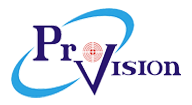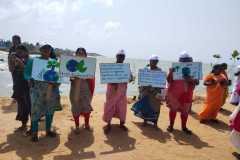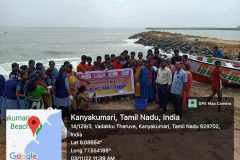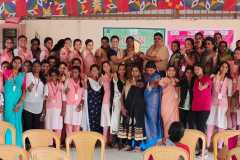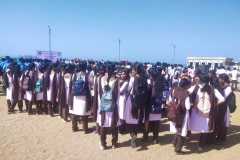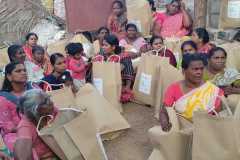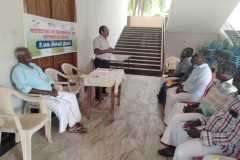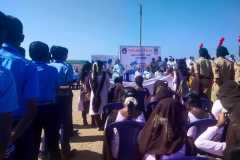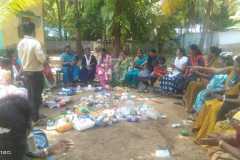


Supported by BMZ / Malteser International, the project on “Protecting the environment and empowering women through their innovative and active involvement in the plastic recycling value chain” – WOMENPRENEURS4PLASTICS – is implemented by four partner organizations in India, Nepal, Indonesia and Philippines. Pro-Vision began the project implementation in November 2021 in 20 villages in Kanniyakumari District.
 The overall objective (impact) of the project is to contribute to the protection of ecosystems and livelihoods (SDG 12, SDG 13, SDG 14), to improve human health (SDG 3); to reduce poverty (SDG 1) and women’s empowerment (SDG 5) in Kanyakumari District, Tamil Nadu/ India. The aim of the project (Outcome) is Plastic pollution in communities is reduced and income opportunities for young women are improved. The sub-goals (outputs) aimed at are:
The overall objective (impact) of the project is to contribute to the protection of ecosystems and livelihoods (SDG 12, SDG 13, SDG 14), to improve human health (SDG 3); to reduce poverty (SDG 1) and women’s empowerment (SDG 5) in Kanyakumari District, Tamil Nadu/ India. The aim of the project (Outcome) is Plastic pollution in communities is reduced and income opportunities for young women are improved. The sub-goals (outputs) aimed at are:
- Knowledge in communities about the negative impacts of plastic pollution has increased; attitudes and practices towards “3Rs – Reduce, Reuse, Recycle” have changed positively.
- Women’s Plastic Entrepreneur Groups (WPEGs) are established and functioning as a base to manage a Women’s Plastic Bank (WPB) and recycling workshops.
- Local women plastic collection points (Women Plastic Banks) are in operation
- Recycling workshops are established and in operation and
- Women plastic entrepreneur groups (WPEGs) network with other WPEGs, the recycling industry, businesses, shops, local government agencies, etc. to share ideas and improve collaborations and marketing.
AWARENESS ON 3 R
The first step was to promote awareness in the community about 3 R – Reduce, Reuse and Recycle. Towards this community sensitisation programmes, transect walk and awareness on solid waste management are conducted in each village. Through these programmes the participants gain knowledge about plastic, its advantages and dis-advantages. They realise how their habits of burning plastics, filling land with plastics and throwing away is harmful to human being, animals, marine life and the environment and also our future generations.
Home based solid waste management trainings are organised to enable the community to gain awareness on domestic solid waste management, importance of segregation of plastics at source and gain more income through segregating the solid waste. The participants gain ideas how to convert wet waste into natural fertilizer and they realise their responsibility to segregate their waste at their home itself. To support them in behaviour change, the community organisers visit the target beneficiaries and advise them how to segregate their waste at home in a safe and healthy way.
FORMATION OF WOMEN PLASTIC ENTREPRENEUR GROUPS (WPEG) AND CO-ORDINATING THEM
Women Plastic Entrepreneur Groups are formed at strategic locations. The membership in groups is guided by certain criteria including but not limited to: Women below poverty line, women headed family – single / deserted / widow, women without regular job or access to regular income, interested to take up income generation activities particularly related to plastics and interested to be part of groups and involve in community events.



The groups have internal savings and subscription also and bank account and deposit money in the bank account, that adds safety for the money and also recognition for the groups. From the initial stage itself, environmental protection is given due emphasis and the groups are motivated and guided to undertaken activities towards this end. The women groups are co-ordinated as Vazham Women Micro Entrepreneurs Forum and this forum is registered and evolved to take over the management of the groups and sustain the plastic banks, recycling workshop and work for the environmental protection.
ESTABLISHMENT OF WOMEN PLASTIC BANKS AND RECYCLING WORKSHOPS
One of the key activities visualised for the WPE-Groups is management of plastic banks, where they could buy or collect plastics from different sources and sell them. Thus, they could support protection of environment and also earn supplementary income.
The groups are financially and technically supported to establish and manage plastic banks. As they are established within in the community and managed by the group, they get better acceptance from the community and enjoy their support. Many families are determined to give their plastic waste only to the women plastic banks. Some banks also deal with non-plastic waste as they provide them with more income to sustain their initiatives.
The project also visualises establishment of plastic shredding units, grinding workshops and recycling or reprocessing plants. These facilities are also used as training centre for the women group members.
